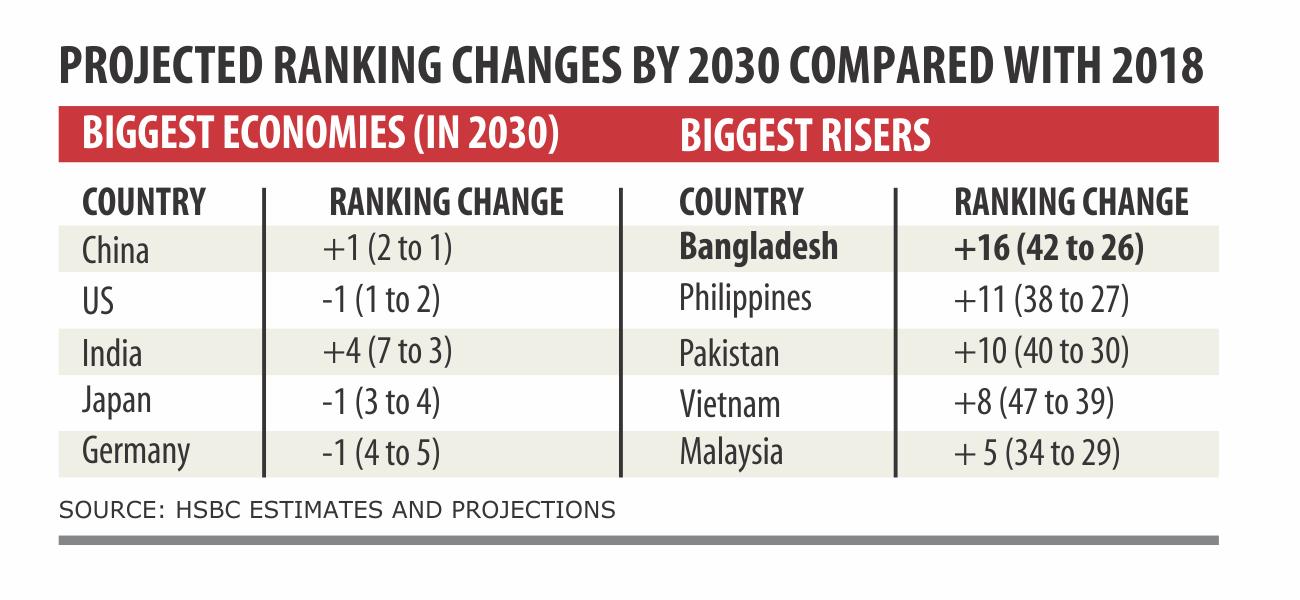Bangladesh to be 26th largest economy

Bangladesh is likely to be the biggest mover in the global gross domestic product rankings in 2030, becoming the 26th largest economy in the world from 42nd now, according to the latest report of HSBC Global Research.
The report -- The World in 2030: Our long-term projections for 75 countries -- showed Bangladesh's economy would jump 16 notches, the highest by any country, between 2018 and 2030.
Bangladesh would be followed by the Philippines, Pakistan and Vietnam and Malaysia on the list of the biggest risers.
“The starting point for a country is a key part of its potential growth. It is very clear that a country such as Bangladesh has far more potential for growth than one like Norway, which is far richer,” said the report, which was published recently.
HSBC's long-term growth model projections showed that the real GDP growth of Bangladesh would be 7.1 percent per year up to 2030, the highest among the 75 countries included in the report.
The country is projected to grow 7.3 percent from 2018 to 2023, 7.0 percent from 2023 to 2028, and 7.2 percent from 2028 to 2033.
Bangladesh will be a $700 billion economy in 2030 from $300 billion now, according to the report.
The research refreshed HSBC's long-term forecasting framework to make model projections for 75 developed, emerging and frontier economies to assess growth potential and changes in global rankings by 2030.
The report said China is set to continue to be the single biggest contributor to global growth over the next decade and by 2030, will have become the world's largest economy. One of the most striking rises amongst the rankings will be by India, which is set to become the world's third-largest economy in just over a decade, up from seventh today – leapfrogging the second- and third-largest developed economies of Germany and Japan.
The report focuses on six main categories of economic indicators: catch-up potential, population (size and shape), human capital (education and healthcare), politics, openness and technology.
Better educated workers are more likely to be productive, it said.
Poorer countries will have room to catch up by simply adopting best practice elsewhere, and those with strong governance are more likely to facilitate investment and growth. Environmental challenges will be one of the policy challenges, said the report.
“It is no coincidence that four of the top six countries for projected growth – India, Pakistan, the Philippines and Bangladesh – also top the list of countries that have estimated to be the most vulnerable to climate change.”
The report said the biggest immediate danger to the projections is if the open borders that have delivered so much prosperity are closed.
“Recent actions by the US administration are not encouraging on this front as it is hard to see how such a wave of protectionism could benefit any individual economy, or the system as a whole.” Global growth would inevitably be weaker but as always, there would be distributional effects, it said.
The impact on confidence and investment would likely be negative while the disruption to integrated global supply chains established over the past few decades would ultimately weigh on living standards.
Natural disasters can send economies seriously off course as their development seeks to replace what was lost (although they have a temporary upward impact on GDP growth) rather than make any further leap forward.
The report said the quality of institutions will play a big role in delivering on the potential growth in a country. Without a regulatory environment that makes investment attractive and facilitates investment, potential growth will be lower.
